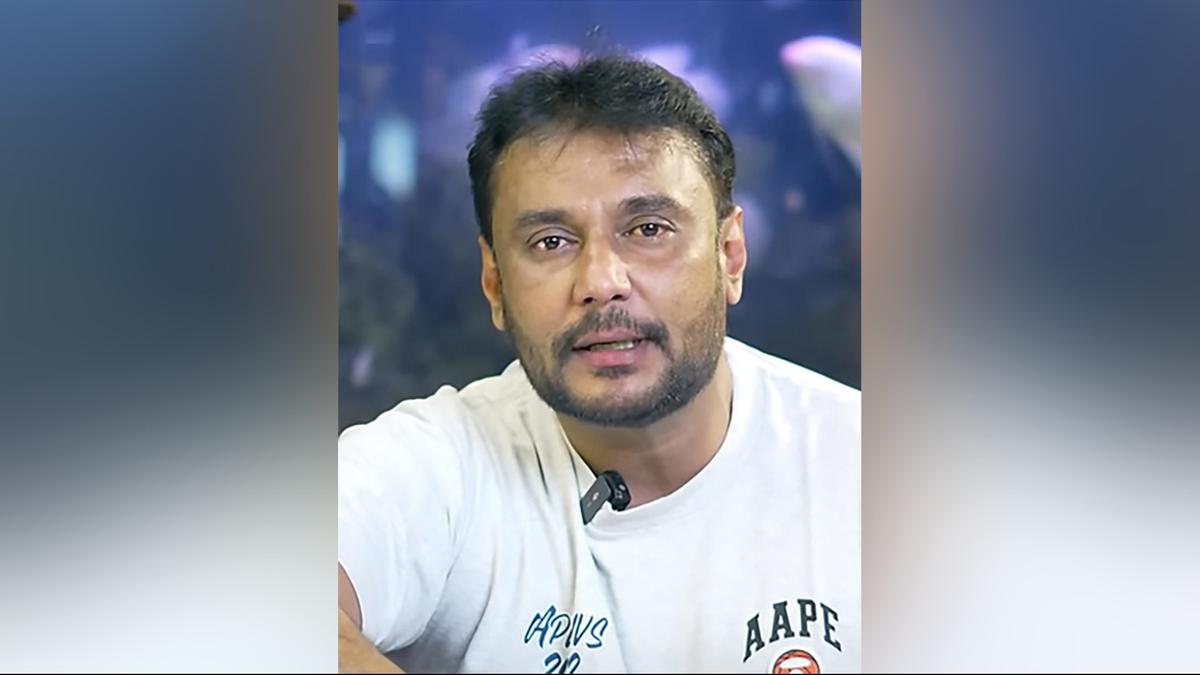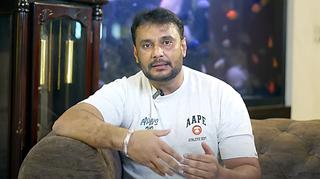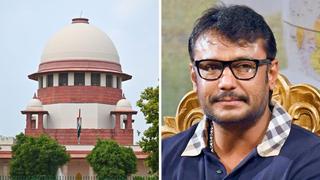Kannada actor Darshan, embroiled in a high-profile legal battle, broke down in court as he described the “unbearable” prison conditions he has endured since his arrest. The courtroom fell silent as the actor, usually seen as strong and composed, was visibly shaken while narrating his experiences. He spoke of overcrowded cells, unhygienic facilities, and lack of access to basic amenities, saying the ordeal had taken a toll on his mental and physical health. His testimony struck an emotional chord, with many in attendance left visibly moved by the raw account.
Darshan’s lawyers argued that his treatment in prison violated fundamental human rights, emphasizing that every undertrial prisoner deserved dignity and humane conditions. They highlighted instances of inadequate medical facilities, poor sanitation, and limited food quality, presenting reports to support his claims. The defense insisted that prison reforms were urgently needed, not just for Darshan, but for countless others suffering silently in the system. Observers noted that the star’s emotional breakdown has drawn rare public attention to the state of prisons in Karnataka, sparking wider debate on systemic neglect.
Prison officials, however, countered the claims by stating that all inmates, including Darshan, were being provided with standard facilities available under prison rules. They rejected allegations of discrimination or deliberate negligence, asserting that challenges such as overcrowding were issues across the country. While acknowledging that conditions may not be ideal, they stressed that resources were limited, and efforts were ongoing to improve infrastructure. The state government has yet to make a formal statement but faces mounting pressure to address the concerns raised during the emotional hearing.
Public Debate on Prison Reforms Rekindled
Darshan’s testimony has reignited the long-standing debate on prison reforms in Karnataka and across India. Legal experts argue that the judiciary has repeatedly emphasized the need for humane conditions, but implementation on the ground remains weak. Activists point out that high-profile cases like Darshan’s bring visibility to an issue that has often been ignored when affecting marginalized inmates. Many believe that his status as a celebrity could force policymakers to revisit stalled reforms, potentially benefiting the broader prison population in the long term.
Human rights organizations have also weighed in, stressing that prison is meant for rehabilitation, not dehumanization. They argue that regardless of the charges, detainees deserve access to basic rights such as clean water, medical care, and adequate space. Several NGOs have called for independent inspections of prisons to ensure transparency and accountability. Meanwhile, supporters of Darshan have expressed solidarity, demanding that he be treated with fairness and dignity. The actor’s breakdown has not only highlighted his personal plight but has also turned into a catalyst for renewed public scrutiny of prison conditions.

Awaiting Judicial Response on Prison Grievances
The court has reserved its decision on Darshan’s plea, with the next hearing expected to examine prison conditions more broadly. Legal observers anticipate that the judiciary may direct the state government to submit reports on prison facilities, which could pave the way for systemic reforms. For Darshan, the hearing represented both a personal release of pent-up anguish and a symbolic fight for dignity. As he awaits the court’s response, the actor’s words continue to resonate outside the courtroom, sparking conversations about the intersection of justice, celebrity, and human rights in Karnataka.
Darshan’s outpouring in court has added a deeply personal dimension to a case already under intense public scrutiny. Supporters gathered outside the court premises expressed concern for his wellbeing, chanting slogans and holding placards demanding fair treatment. His breakdown was widely covered across television channels and social media platforms, turning the spotlight firmly on the living conditions of prisoners. Analysts suggest that while celebrity cases often dominate headlines, they can serve as powerful vehicles for pushing forward long-overdue conversations about systemic neglect in the penal system.
The incident has also triggered a polarizing response among the public. While fans sympathize with Darshan’s suffering and call for immediate relief, critics argue that the plight of ordinary prisoners rarely receives such attention. They insist that reforms should not be driven solely by the experiences of high-profile individuals but must encompass the broader population living under similar or worse conditions. This divergence of opinion has sparked heated debates on talk shows and online forums, with many emphasizing the importance of equal justice and fairness for all inmates.
Legal experts note that prison overcrowding remains one of the most pressing challenges in Karnataka. Many prisons house inmates far beyond their sanctioned capacity, leading to severe strain on resources. The lack of adequate sanitation facilities, coupled with insufficient healthcare, creates conditions ripe for the spread of infectious diseases. Inmates often endure limited access to nutritious food and safe drinking water, compounding their suffering. Lawyers advocating for reform argue that these issues persist due to inadequate budgetary allocations and slow-paced infrastructure upgrades.

Darshan’s lawyers are preparing to present more detailed evidence in the upcoming hearings, including affidavits from fellow inmates and independent reports on prison conditions. Their strategy appears to be aimed at broadening the conversation beyond Darshan’s individual case, highlighting structural flaws that affect thousands of prisoners. Activists are hopeful that the court may order an independent audit of prisons, which could set the stage for long-overdue reforms. Observers believe this case may serve as a legal precedent for future petitions on similar issues.
The Karnataka State Human Rights Commission has reportedly taken note of the developments, with calls emerging for an inquiry into the conditions inside jails. Rights activists stress that India’s commitment to international conventions on human rights obligates the state to uphold minimum standards of detention. Failure to do so, they argue, tarnishes the country’s reputation and undermines constitutional guarantees of dignity and justice. This growing chorus of voices demanding accountability could add pressure on the state government to act decisively in the coming weeks.
Political reactions to Darshan’s emotional plea have also been swift. Several opposition leaders criticized the government for its failure to improve prison infrastructure despite repeated warnings. They accused authorities of neglect and insensitivity, framing the issue as one of governance rather than individual grievance. Ruling party representatives, however, maintained that the actor was being treated in accordance with standard procedures and accused the opposition of exploiting the situation for political mileage. The politicization of the issue ensures that it will remain in the public eye for some time.
For fans of Darshan, the incident has been deeply emotional, with many taking to social media to express solidarity and concern. Some shared personal stories of relatives who had faced similar hardships in prisons, using the moment to shed light on a wider issue. Others organized online campaigns demanding urgent action from the government and judiciary. The collective voice of supporters, amplified by Darshan’s celebrity status, has ensured that the conversation around prison reforms extends beyond legal and political circles into everyday households.
Observers note that the public empathy for Darshan may also bring a cultural shift in perceptions of prisons. Traditionally viewed as punitive spaces, there is growing recognition that incarceration should focus on rehabilitation rather than degradation. Films, literature, and media discussions are now reflecting on the balance between justice and humanity. Darshan’s case, ironically, mirrors the themes of several of his past movie roles, where justice, resilience, and human dignity are central. This cultural resonance is expected to fuel continued interest in his plight and its wider implications.

The judicial fraternity is watching closely to see how the case unfolds. Senior advocates suggest that if the court orders structural reforms, it could lead to mandatory inspections, regular monitoring, and stronger legal safeguards for prisoners. Such an outcome would mark a significant milestone in India’s penal history. However, much depends on how the government responds to judicial directions, as implementation has often been the weakest link in reform efforts. The next few hearings could therefore prove pivotal in shaping the trajectory of prison rights in Karnataka.
Until then, Darshan remains in custody, navigating the dual burden of legal proceedings and prison life. His emotional testimony continues to reverberate, drawing attention not only to his personal hardships but also to systemic issues long ignored. For many, the case has become a symbol of the need to reconcile justice with humanity, reminding society that dignity is a right owed to all, regardless of status or circumstance. Whether this momentum translates into real change will be closely watched by citizens, activists, and policymakers alike.
Follow: Karnataka Government
Also read: Home | Channel 6 Network – Latest News, Breaking Updates: Politics, Business, Tech & More

